No Echo Read online
Page 13
“Gagliostro.”
“Exactly. He’s threatening to report you to the Norwegian Bar Association.”
Karen Borg chuckled.
“He can report me to the King if he wants, if only he’ll answer my questions. I’ll give him a call. And you …”
She struggled to haul her academic gown, briefcase, coat, new pair of tights, and cup of coffee into her office. The cup fell on the floor.
“Shit! Sorry.”
“I’ll fix it. Just go in.”
Johanne Duckert was more than twenty years older than her boss. She was the lawyer’s next-door neighbor in Vinderen, and had accepted her offer of a ten-till-three job during a garden party last summer. Mrs. Duckert had never worked outside the home, but there were limits to how much time could be wasted in her well-maintained garden. After her husband had died two years previously, she had often thought of finding herself something else to do. It did not come to anything until Karen happened to mention that she had a pressing need for help, but was short of money.
“I’ve more than enough money,” Mrs. Duckert said happily, and moved into the office in C. J. Hambros plass with her flowerpots and photos of her grandchildren.
When, many years ago now, Karen Borg had been a partner in a major commercial lawyers’ firm in plush premises in upmarket Aker Brygge, she’d had two secretaries. They were young, had qualifications and education, a command of four different word-processing programs, and flirted discreetly with the clients. Mrs. Duckert had hardly touched a typewriter until she was sixty-one years of age, but her spelling was awe-inspiring, she had a colorful turn of phrase that it had taken Karen some time to get used to, and in addition she remained at work until six or seven o’clock in the evening without ever asking for overtime pay. Mrs. Duckert had blossomed in tandem with the roses that flourished in plant pots and containers all over the outer office.
Karen Borg’s clients were no longer men in tailored suits. Their wives, on the other hand, did come to her. Shuffling into the office, they dissolved into tears with violins playing in the background. After thirty years of marriage they were being replaced by someone younger, smarter, more beautiful; they were in a state of collapse over a demand for an unequal division of assets from their spouse, who wanted to uproot them and at best install them in an apartment in Groruddalen. They sat on a chair in Karen Borg’s office with a box of Kleenex on their lap, having just learned that their husband, after a long life and three grown-up children, was of the opinion that he had finally found love with a twenty-eight-year-old.
These clients did not need any flirtation. They needed Mrs. Duckert’s tiny cakes and coffee with a little dash of something stronger, just to steady the nerves of course. They needed the clasp of Mrs. Duckert’s warm hand, and a reassuring conversation about gardening and daughters-in-law, and finally to remember those beautiful grandchildren!
The men who came to see Karen Borg hardly knew what flirting was. They had skinny legs in tight trousers and arms covered in needle marks. They too were given coffee, cakes, and soothing conversation by Mrs. Duckert, though she did leave out the dash of booze.
“They quite simply don’t benefit from a drop of the hard stuff,” she often said. “It makes them ill.”
Karen Borg had listened to the voice at the other end of the phone line for quite some time. The man was agitated, and it would be best to let him finish talking. Eventually he had calmed down somewhat.
“I can well understand that you find it unpleasant, Gagliostro,” she said calmly. “But this is not in fact your private business. You can either answer me now or wait until the Probate and Bankruptcy Court asks you.”
Gagliostro was working himself up into a frenzy again, and Karen Borg was forced to interrupt.
“You can’t just say that everything belongs to you, in actual fact,” she said in the same calm tone. “It’s not acceptable. As his spouse, Vilde has the right to access her husband’s finances. It’s the law, Gagliostro. I can—”
A vehement diatribe forced her to hold the receiver twenty centimeters from her ear.
“Listen to me.”
She sat up straight in her chair and raised her voice. That helped.
“If you mean that you own all the shares, can’t you just fax me proof of that? If the situation is as you claim, then surely there’s no reason to make such a song and dance about it? Fine. Then we’ll leave it at that.”
Karen Borg keyed in another number.
“Johanne, can you come in with the fax from Entré as soon as it arrives?”
She kicked off her shoes and began to pull off her tights as she scanned the papers on the desk. She had only just put on the new tights when Vilde Veierland Ziegler knocked on the door.
The young widow seemed unusually pale, even taking the time of year into consideration. Karen thought she must have lost weight in the four days that had passed since they had last met. She poured a cup of tea from a thermos flask and dipped a little wooden spoon into a pot of honey.
“Here,” she said, stirring it thoroughly. “Drink this.”
Vilde stared apathetically at the cup, without making any move to accept it. Karen understood that she should not make any attempt to console the girl. That would make her fall to pieces. It was doubtful if the diminutive woman in the visitor’s chair was in any fit state to receive information. She would have to keep things simple.
“Chin up. This doesn’t look too bad. Firstly, there’s the apartment at Sinsen. That seems to belong to the Entré restaurant business.”
Vilde looked at her for the first time.
“Then … then I don’t have anywhere to live.”
Karen raised her hand and smiled encouragingly.
“You’ve got the apartment in Niels Juels gate of course and—”
“I don’t want to live there. I hate that apartment!”
Her voice cracked and her tears threatened to spill over.
“Take it easy now. Just relax until I’ve explained all this to you. It will take some time to obtain an overview of the entire estate, but what I can tell you for certain …” Karen pushed the teacup toward her once more. “… is that you’ll inherit a lot of money.”
Vilde Veierland Ziegler curled her hand slowly around the hot cup.
“Will I inherit a lot of money?”
Two red patches grew visible on her cheeks, and Karen thought she could discern the suggestion of a smile on Vilde’s face.
“It was obvious that your husband had intended for you to have separate ownership of his estate. I’ve spoken to his attorney, an old colleague of mine. He had been given the task of drawing up a marriage settlement, but Brede had not yet made an appointment to come and sign the documents. So it’s all very straightforward. If the marriage settlement hasn’t been signed by both of you, then it’s not valid. Therefore you have joint ownership.”
Karen flipped through the papers. For some reason she found it objectionable to see how her client’s demeanor had altered.
“Since Brede did not have any children, you are his sole heir. As far as the restaurant is concerned … Entré is a limited company. Brede and Claudio owned approximately half each. They had an agreement about who should decide what in the business. Moreover, it is provided for that if one of them dies, the other is to take over the whole enterprise.”
She glanced again at her client, whose introspective expression was on its way back.
“But such an agreement is not necessarily binding. An agreement in which you … If you want to decide what will happen with your possessions when you die, that’s called a testamentary disposition. There are certain formal requirements for that. It means that you must write a will. Brede had not done that. A partnership agreement is not any kind of will. That probably means that you inherit Brede’s shares in Entré as well as the apartment in Niels Juels gate. Although there is some outstanding debt in both places, it should still amount to a considerable sum of money. Several million kroner.”
>
Karen continued to thumb through the bundle of papers. Out of the corner of her eye she could see that Vilde had lifted the cup to her mouth.
“And besides … There are a lot of other assets here. That is to say, things … valuables. Including quite a number of shares in an Italian company. Do you know anything about that?”
Vilde shook her head. She was far too young. She could not hide the fact that she was biting her lip to stop herself smiling. Karen gave a slight shudder. It had crossed her mind as soon as their first meeting a few days earlier: there was something about this young woman that did not add up.
“Then we’ll discuss all this in the near future.”
Karen forced out a smile.
When Vilde Veierland Ziegler left the office, Mrs. Duckert brought in a cup of coffee.
“You must have done wonders for that young lady,” she said, pouring milk from a porcelain jug. “When she arrived she looked like a ghost. By the time she left, well, she gave a lovely smile when she said goodbye.”
25
“I was crazy and had decided to recover my health.”
Suzanne put down her spoon and flashed a smile at Idun Franck. The publishing editor had not touched her food. Why she had been invited to dinner was still a mystery to Suzanne Klavenæs. They had both worked together on the Ziegler book for several months now, without any kind of personal exchange beyond the purely trivial. Now, when it looked as if the book project might be shelved, Idun had suddenly invited her for bouillabaisse. Suzanne’s initial impulse was to decline with thanks. But Idun had said they could combine the meal with work, and anyway, there was something about her. Idun was just as Suzanne remembered – or, more to the point, imagined – her real-life fellow-citizens: friendly in a reserved way, smilingly formal, and professionally attentive. On a personal level she kept her distance, and Suzanne had no need to fear a stream of invasive questions. Idun Franck was nothing like the woman at passport control at Gardermoen airport – Tone something-or-other. Delightedly, she had recognized Suzanne and begun to chatter about the old days at the Cathedral School. The queue had grown longer behind Suzanne, who had been unable to tear herself away until she finally had her passport returned and literally stumbled into Norway.
“I was ill as a teenager. Very ill. I was admitted to a closed ward at Gaustad Hospital for six months. I needed to get away to regain my health.”
She was surprised at herself. Admittedly it was no secret that she had been crazy. All her friends in France knew that – at least the ones who knew her well enough for it to be natural to talk to them about something that had happened more than fifteen years ago. But she spoke increasingly seldom about it. Idun’s question about why she had moved to France had been so unexpected that the answer simply spilled out unbidden.
“I’m actually half-French,” she added by way of explanation. “I got my surname from my father. My mother was French. Even though she died when I was little, I had family and friends there, so it was natural to go when I first started traveling.”
She helped herself to more bouillabaisse. Obviously home-made, it tasted of Marseilles.
“This is really delicious,” Suzanne said. “I don’t look as if I eat very much, but that’s wrong. I love food. I’ve just been very lucky with my … What’s it called in Norwegian again … metabolics?”
“Metabolism. Wish I was.”
When Suzanne had received a request from the publishing company to take the pictures for their book about Brede Ziegler and his kitchen, she had mulled it over for twenty-four hours. From the publisher’s point of view, the approach was virtually a shot in the dark; Suzanne Klavenæs was a regular supplier of photo-reportage for Paris Match and had also created a ten-page illustrated story for National Geographic about the flood of refugees from Central Africa. She was accustomed to major assignments, and remuneration to match.
“Home,” Suzanne said out of the blue. “For some reason I always call Norway ‘home’. I accepted this job because I wanted to see if it was possible for me to be here. After what had happened. After … When my father died, I arrived here on the morning plane and left an hour after the funeral. My relatives have never forgiven me, I think. But when … At that precise moment I didn’t know whether I would be able to tolerate this country. Whether I’d got over it all.”
“Is it possible, do you think?”
Idun Franck poured out more wine for them both and sat spinning her own glass in her hand.
“I don’t really know what you’ve been through, and I don’t mean to pry. But … Women like the ones you spoke of from Bosnia. Raped and … And the refugees in Africa who lost their children on the way, one by one, through illness and hunger and … Is it possible to flee from these things, do you think? Can people really have the strength to go on living? A genuine, full life?”
Suzanne suddenly noticed that it was Sarah Brightman’s voice she could hear from the loudspeakers in the living room. She could not square the torch singer with the rest of Idun Franck. Admittedly the decor in the apartment was not especially well coordinated, but the mixture of antiques and IKEA furniture created an overall impression that indicated a sure touch in matters of taste, all the same.
“I’ve read,” Idun continued, with a brief burst of laughter, “that the liver is the only organ in the body that can renew itself completely. It’s formed of so many new cells that over a five-year period we end up with an entirely new liver. If we don’t drink too much, that is.”
She raised her glass.
“Is it like that with a human soul, do you think?”
Without waiting for a reply, she stood up abruptly and cleared the plates.
“We need to work. We’ll have coffee in the living room. Do you have the pictures with you?”
Suzanne followed her and sat down on the leather settee. When she arrived she had left her portfolio of photographs on the coffee table and she was taken aback that Idun had not noticed.
“Where did I put that manuscript?” Idun Franck murmured, inspecting the magazine rack and behind the TV set. “I must have mislaid it. I know I brought it from the office.”
The search was futile: Idun Franck lifted chair cushions and peered inside two empty decorative vases. Suzanne poured coffee for herself from a ceramic pot, speculating that Idun must be one of those people whose sense of order is depleted during their work day.
“We’ll have to manage without it,” Idun said feebly. “Let me see the photos, please.”
Concentrating intently, they worked without a break for two hours.
“The food and landscapes are obviously no problem,” Idun Franck concluded as she ran her fingers though her hair. “I suggest you continue. I’ll speak to Claudio and tell him you need to photograph the dishes described in the text.”
“Does that mean you’ve decided to publish the book?” Suzanne asked, drinking coffee number four. “To some extent, it’s fine to make plans based on what we already have, but should I go on taking photos?”
“We won’t decide about actual publication until the investigation is over. But we’ve established that we’ll try to run with the book for as long as possible, until we come to that decision. Not my choice. I’m subject to a boss who is … Forget it! Sorry. I’ll count the dishes described in the text and give you an updated list. That one’s marvelous, by the way!”
She fished out a black-and-white photo of Brede Ziegler.
“It’s so … Spontaneous, in a sense! Didn’t he see you?”
“No. I agree. It’s excellent, if not exactly flattering.”
Suzanne began to gather the photos, painstakingly ensuring that the various Post-it notes were attached to the reverse of the appropriate images. Idun snatched up the notes she had made in the course of the evening and stashed them inside Unni Lindell’s latest crime novel, left lying on a sideboard beside the TV.
“Then I certainly won’t forget them,” she said, smiling faintly. “By the way …”
Sh
e glanced at the book, as if it had jogged her memory.
“Have the police spoken to you?”
“The police? No. I must be very far down their list of interesting witnesses … Why do you ask? Have they spoken to you?”
Suzanne closed the folio of photos and headed for the door. When Idun made no sign of following, she turned round.
“Yes,” Idun said. “They have spoken to me. I’m in dispute with them about access to unpublished material. Confidentiality of sources. It’s like talking to a brick wall. Do you know that police officers nowadays don’t look like police officers? This policeman I spoke to claimed to have only a first name. He looked like a … neo-Nazi! Inverted cross on his ear and …”
Idun ran her hand over her head with a smooth motion, almost as if she were shaving off her hair. Suzanne narrowly avoided dropping the photograph portfolio as she leaned on the doorframe for support.
“Mon Dieu,” she said softly. “This country is really like a … village?”
“Do you know who I’m talking about?”
“B.T. He’s called … I always called him B.T.”
“No. His name is Bobby or Billy, or something like that. Can it be the same person? Do you know him?”
“He was one of the people I wanted to flee from. That time when I was crazy and had decided to regain my health.”
Suzanne Klavenæs headed for the hallway, where she put on her coat, and Idun followed. The two women stood at either end of the long corridor, one tall, dark and almost skinny, the other small, plump, with ash-blond hair.
“Thanks for coming,” Idun said in a whisper. “Will I phone for a taxi?”
Suzanne said she would prefer to walk. When she had reached thirty meters along Myklegårdsgate, approaching the path through the park down to Grønlandsleiret, she turned to see all the lights in Idun’s apartment switched off. Only at the kitchen window could she make out the glimmer of a candle. For a moment she thought she spotted Idun Franck’s face at the window, but it might have been her imagination. All the same she shivered, and it struck her that Idun Franck was the only person she had ever met whose photograph she had never considered taking. She couldn’t work it out. She simply couldn’t fathom it.

 A Grave for Two
A Grave for Two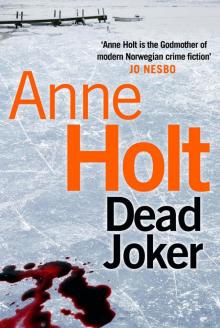 Dead Joker
Dead Joker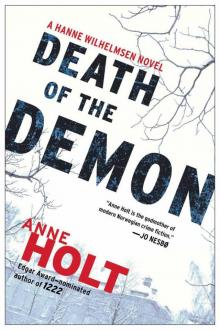 Death of the Demon: A Hanne Wilhelmsen Novel
Death of the Demon: A Hanne Wilhelmsen Novel Punishment aka What Is Mine
Punishment aka What Is Mine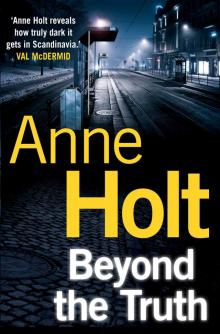 Beyond the Truth
Beyond the Truth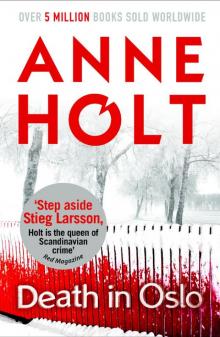 Death in Oslo
Death in Oslo The Blind Goddess
The Blind Goddess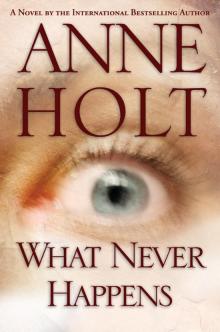 What Never Happens
What Never Happens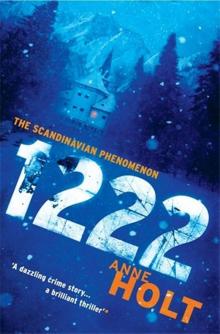 1222
1222 In Dust and Ashes
In Dust and Ashes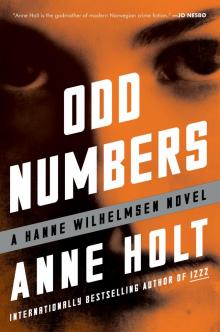 Odd Numbers
Odd Numbers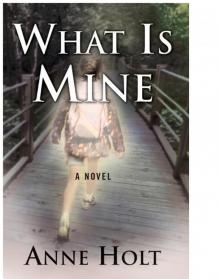 What is Mine
What is Mine What Dark Clouds Hide
What Dark Clouds Hide Blessed Are Those Who Thirst
Blessed Are Those Who Thirst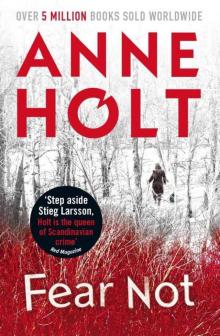 Fear Not
Fear Not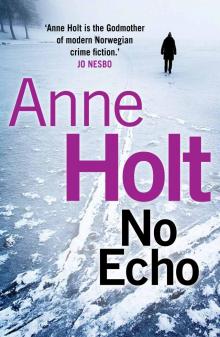 No Echo
No Echo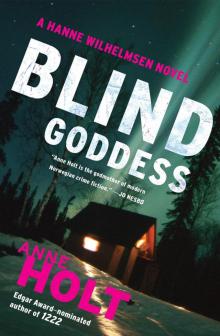 Hanne Wilhelmsen - 01 - The Blind Goddess
Hanne Wilhelmsen - 01 - The Blind Goddess